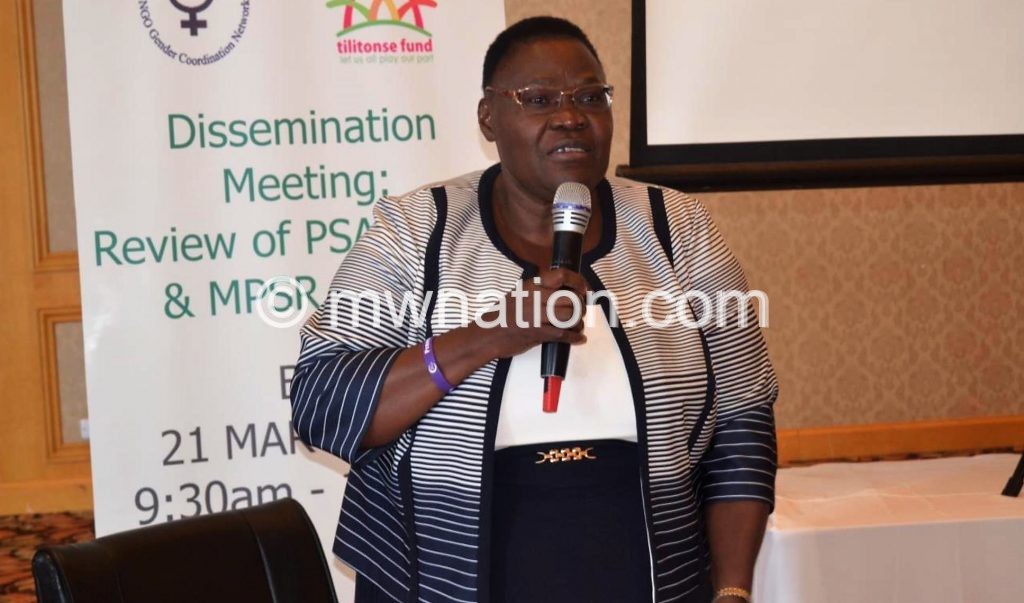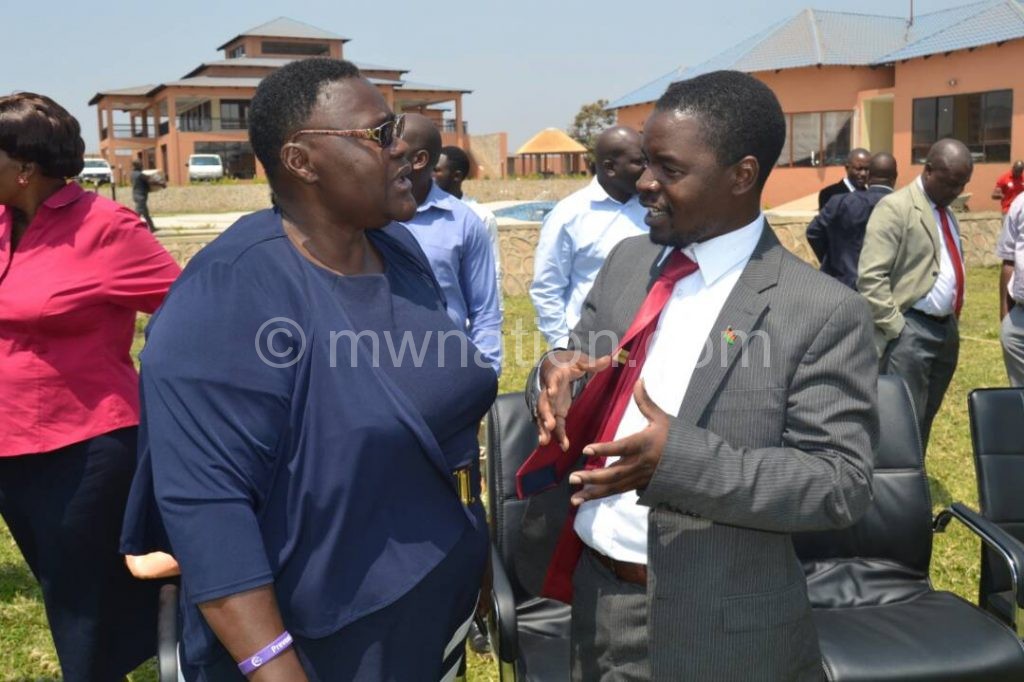Kaliya’s long walk in activism
On December 9 this year, gender activist Emma Kaliya received a lifetime Human Rights Achiever Award in recognition for her undying efforts to promote human rights in Malawi. For the past 30 years, she has been a consistent and persistent voice in pursuit for gender justice. Our Lilongwe Assistant Bureau Chief SUZGO CHITETE shares some insights on why Kaliya deserves this award.
To many, the award did not come as a surprise, knowing how passionate and consistent Emma Kaliya has been in promoting human rights in Malawi. She is one prominent advocate of gender justice and deserves to receive the lifetime human rights award.

Her contributions include a push for the enactment of gender-responsive legislation, inspiring male involvement in promoting gender equality and mentoring many in human rights advocacy. These achievements have not come cheap, but through passion, resilience and focus.
“First and foremost, I never expected that I would receive this award. It was a surprise to me,” Kaliya said in an interview over the weekend. The response did not come as a surprise because she is the kind of person that does not believe in self-glorification even where she deserves credit.
She said: “Such surprises mean a lot to me because they come in a very genuine way. The chief judge was Justice Redson Kapindu [of the High Court of Malawi] and this gives you confidence that these awards were very genuine. I did not even know who had submitted my name for nomination.”

The fact that someone, unknown to her, submitted her name says a lot about how other people value her work. The human rights defenders awards are a collaborative initiative of the Youth and Society (YAS), Malawi Human Rights Commission (MHRC), Human Rights Defenders Coalition (HRDC) and Centre for Human Rights and Rehabilitation (CHRR).
It seeks to pay tribute to “exceptional human rights defenders who have exemplified courage, resilience, innovation and impact in advancing and safeguarding human rights and fundamental freedoms, often braving significant personal or institutional risks” according to a statement posted on HRDC Facebook page.
Kaliya perfectly fits into the description of the award. In the late 1990s and early 2000, she was among female activists who took Malawi by storm after launching a fierce campaign against gender-based violence.
She recounts: “We had to endure attacks from the public. They said we were frustrated because of failed marriages and, therefore, we created a movement to cause chaos or disrupt marriages. The cause for women empowerment was completely misunderstood.”
While she has so many high moments in her life, she finds the process that led to the enactment of the Prevention of Domestic Violence Act in 2006 as a serious test for her resilience.
“Just a week before the Bill was tabled in Parliament, there was a front page news article with the Malawi Law Society saying the Bill was stupid. This was really some negative energy we thought would influence members of Parliament [MPs],” narrated Kaliya who added that it shattered the team which had worked for five years to see the bill passed.
Interestingly, according to Kaliya, this was at a time when the country had just witnessed some gruesome gender-based violence in which a woman in Dowa had her hands cut off by a husband. This should have been a motivation to see the law passed with ease, she reasoned.
“We never slept that week, but to strategise some more. When the Bill got into the house, we were even more devastated as it was subjected to roll call voting. This was not supposed to be the case. Fortunately, the opponents to the Bill lost by three votes, the Bill was passed,” she narrated further.
Besides this, Kaliya was among critical voices that pushed for the enactment of the Marriage, Divorce and Family Relations Act, the amendment to the law to change the marriage age to 18 and Gender Equality Act which has helped to improve women representation in decision-making positions.
“She is an embodiment of true passion and dedication to service,” said NGO Gender Coordination Network on its Facebook post on December 9 following Kaliya’s award. She led this network for 10 years, using the platform to push for gender justice.
Men roped into gender campaign
In 2003, Kaliya led the process that established the Men for Gender Equality Now (Megen), a platform that has been key in bringing men on board to advance gender justice.
But even this was not without drama as she recalls: “Other activists did not like the approach, wondering how we could bring men on board when they are perpetrators of gender-based violence. It was a matter of time everyone agreed that it was a good strategy, a working strategy.”
Among Megen members are professionals drawn from different backgrounds; lawyers, military officers, police, journalists and members of the civil society.
The grouping, for which Kaliya is patron, has been crucial in organising community awareness campaigns on gender-based violence across the country.
Megen national chairperson Marcel Chisi is indebted to Kaliya for her leadership that has kept the movement alive for 20 years now.
He said: “Great leaders are measured by how many other people they have empowered up the ladder. I am among the many who have graduated from her mentorship, coaching and resource support.”
In no uncertain terms, she has not just preached human rights, but has endeavoured to live the very values.
In a written response, assistant superintendent Wells Munthali, a child protection officer from Malawi Police Service who chairs Megen Central Region Chapter, said he has learnt a great deal from Kaliya’s uncompromising activism.
“For me, she remains one human rights activist who has built my capacity in the gender justice sector. She believed that men are key allies in the fight against gender inequality and gender-based violence when no one else did. She mobilised us into this movement that is now known locally and internationally,” said Munthali.
Draw a line from politics
The father was a politician and he is the one who inspired her into activism yet with an important lesson she has kept for life.
“He used to say I must be impartial and if I truly wanted to be a human rights activist, I must guard against political intrusion in my work. I have stayed true to this word,” she argued.
Not that she has never offered political opportunities before. She has. But she has always resisted the temptation to join politics while still doing her activism which has become quite common these days.
“Politics is about serving people so too is activism. But sometimes the offers that come to activists are not really about serving people, but killing the spirit of activism in them. Activism for money has become common and this is where I have a problem. If I were to join politics, I would not pretend that I was still an activist, but a politician – serving some interest,” argued Kaliya, stressing that this is just her personal view.
Asked on her opinion of activists who join politics or public service and come back to activism, she said these are personal choices.
“Well, I have seen people coming back. Maybe there is no problem for those who do so. My only problem is people’s perception; that we do this for money. For some of us, it is not about money, but staying true to what we believe in. In fact, we do not have a lot of funding. Our earnings are really on the lower side compared to others. If money was the motivating factor, we would not be here today.” she concluded.
Kaliya is is a board member of the Malawi Electoral Support Network/ESN-SA, Southern Africa Gender Protocol Alliance and Gender and adviser for The African Women’s Development and Communications Network (Femnet).
She is a commissioner for the Peace and Unity Commission and UN Women/International Labour Organsiation Global Champion on Decent Work and chairperson of African Women Leaders Network (AWLN).
U n t i l 2 0 1 8 , s h e wa s chairperson of the board of trustees of NGO Gender Coordinat ion Network in Malawi just to mention some of her achievements.
In 2015-2017 she was commissioner in the Special Law Commission on the review of electoral laws from 2015-2017. Human Rights Consultative Committee recognised her and also received a Lifetime Achievers Award (2021).






One Comment